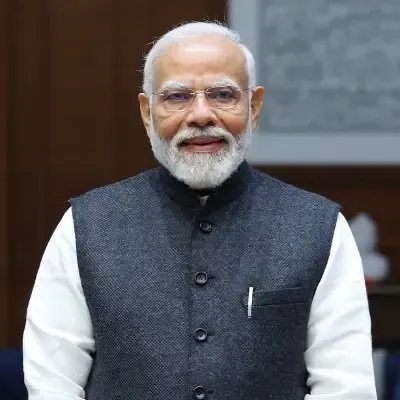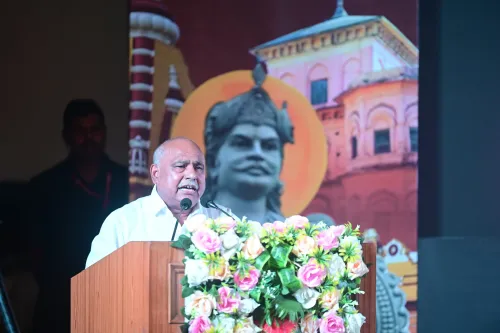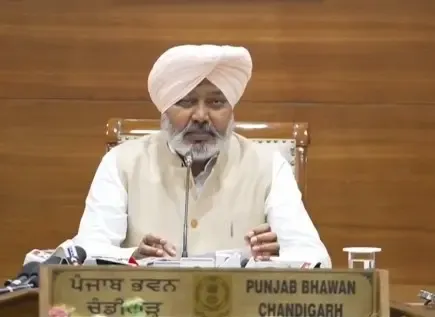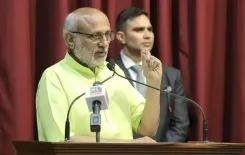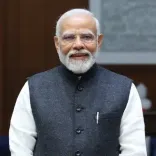How are India and Norway Collaborating to Enhance Green Maritime Technologies?
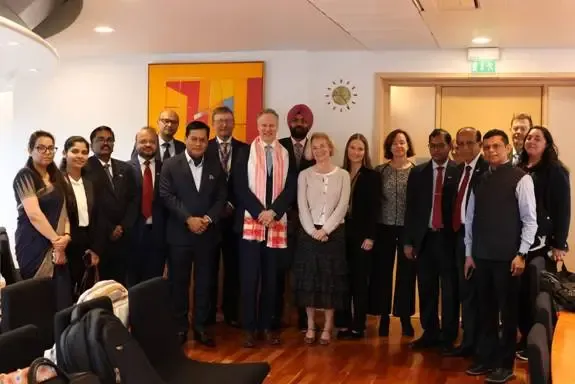
Synopsis
Key Takeaways
- India and Norway are collaborating on green maritime technologies.
- Focus on electrification of ferry systems.
- Joint initiatives to enhance sustainable shipping practices.
- Emphasis on ship recycling and seafarers' training.
- Potential for joint ventures in ocean renewable energy.
Oslo, June 4 (NationPress) Union Minister of Ports, Shipping, and Waterways Sarbananda Sonowal conducted bilateral discussions with his Norwegian counterparts to enhance cooperation between India and the Scandinavian nation in green maritime technologies, particularly focusing on the electrification of ferry systems.
The Minister engaged with Norway’s Transport Minister Jon-Ivar Nygard and Minister of Fisheries and Ocean Policy, Marianne Sivertsen, during the Nor-Shipping event hosted in Oslo.
Sonowal's conversation with Nygard aimed at improving the utilization of Green Maritime Technologies. Both nations agreed to enhance collaboration and share experiences regarding ferry system electrification, inspired by Norway’s successful initiatives.
During his address, Sonowal stated: "India is advancing port infrastructure, green shipping, shipbuilding, and digitalisation as part of Prime Minister Narendra Modi’s 'Maritime India Vision 2030'. India is committed to transforming its ports into global investment centers through public-private partnerships (PPP) and the integration of green energy."
Building on the Green Coastal Shipping Programme and Green Voyage 2050, India and Norway discussed deeper collaboration in green maritime technologies. Both nations explored joint initiatives in smart logistics, digital port ecosystems, and clean coastal shipping. India’s MAITRI initiative alongside Norway’s proficiency in AI-driven port management, digital twins, and alternative fuels like LNG, hydrogen, and electric propulsion present significant synergies to promote a sustainable Blue Economy.
Emphasizing the India-Norway partnership, Sonowal remarked: "We are making substantial strides in Green Shipping, Green Tug Transition, e-Methanol Bunkering, and the development of hydrogen-powered vessels. India and Norway can further this collaboration to manufacture electric ferries and vessels to meet the growing global demand in this sector."
"India is eager to collaborate with Norway to adopt best practices in the electrification of ferry systems to optimize our extensive inland waterways. This initiative aligns with our shared objective of a decarbonized and efficient transport system that facilitates smooth cargo and passenger movement," he elaborated.
In discussions with Norway’s Minister of Fisheries and Ocean Policy, Sivertsen, the Indian minister explored opportunities in ship recycling, seafarers’ training, sustainable fisheries, ocean management, ocean renewable energy, and offshore hydrocarbons.
Both parties agreed to harness Norway’s advanced ship design capabilities and India’s robust shipbuilding infrastructure to collaboratively produce world-class, eco-friendly vessels, catalyzing a transformational shift in sustainable maritime transport.
Conversations regarding the ship recycling sector emphasized leveraging expertise and green technologies to enhance sustainable ship-breaking practices, focusing on environmental, health, and safety standards. The importance of the Alang Ship Recycling Yard in Gujarat was underscored as a potential location for these improvements.
Sonowal sought Norway’s support in developing human capital through seafarer training, especially in polar waters, cybersecurity, and advanced maritime skills.
Highlighting the immense potential of the Blue Economy, he invited Norwegian companies to explore collaborative ventures in ocean renewable energy, particularly in wind and tidal power, sustainable aquaculture, and deep-sea exploration, aligning with environmental objectives and India’s expanding maritime aspirations.
The Indian delegation also proposed a joint feasibility study for operationalizing the Northern Sea Route (NSR) in collaboration with Norwegian and Indian agencies. India expressed a strong interest in partnering with Norway for Arctic navigation, focusing on R&D in Arctic shipping, the design and construction of ice-class vessels, and advancements in navigational technologies.

